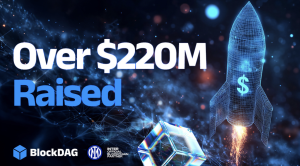This week’s guest is a Cardano SPO fostering cryptocurrency adoption and providing chances for education: Spectrum Pool (SPEC).
Last week we travelled to Africa and asked some questions to the first female Stake Pool Operator in that continent.
This initiative is a point of reference for everything Cardano and every week or two we will invite a Stake Pool Operator (SPO) to answer some questions and give us an update directly from within the Cardano community.
Considering that many of our readers are new to the crypto space, we will have a mix of simple and technical questions.
Hi there, please tell us something about you and introduce your stake pool.
Hello, I am Kiriakos. I am 38 years old and have lived my life 50/50 between Germany and Greece. Currently I live in north Germany with my wife and I am the sole operator of the Spectrum Pool (ticker SPEC). I started programming in the 90s and never really stopped since. I have done a variety of technology jobs, mostly focusing on big, distributed enterprise applications and high assurance mission critical stuff. Lately, I also started managing Software Development organizations.
I run Spectrum Pool as a Mission Driven Pool with a dual mission. Beyond providing the industry typical value to stakeholders in terms of APY returns I want to:
- Use the income from SPEC to fund development of Cardano Tech
- Use the Taxable income from SPEC to support charities that provide Education to the Underprivileged.
Why Cardano and why run a stake pool?
The reason why I took a break from the Blockchain industry between 2014 and 2017 was that I was disappointed by the unprincipled, often outright utopic, perceptions of the people involved in most projects back then. It really just was hacky forks of Bitcoin all the way down. Cardano changed that. Here was a project that wanted to validate its theory and build up a high assurance code base. And contrary to everybody else in the industry, they wanted to bide their time and take it slow instead of making a quick buck. I was Hooked!
As to why run a stake pool, for one I really have the skills in abundance. I had been running blockchain infrastructure in the early days as well and am a passionate self hoster. When I invest my money I also want to work for the success of this investment. Considering my skills this means contributing to making the Cardano network more secure and more decentralized.
You mention using the income from SPEC to fund development of Cardano Tech. Can you tell us about what already has come of this?
Sure! I have been building things on Cardano or for SPOs since late summer 2020. There are SPO tools like the slot-leader-container, which is targeted at high end Stake Pool operations that automate their server builds like I do and want to time their redeployments exactly so that they don’t lose blocks.
Then there is wen.pm a site that lets you track important events for Cardano. And there’s also another dApp that I am working on.
We will talk about that dApp later on. So what about SPEC’s second mission?
I am a firm believer that in order to raise the developing world from poverty and conflict we need to show them what one can do with knowledge. And if the local governments can’t get it done then we should act. This is why I have pledged to support the pencilsofpromise.org charity with monthly donations. To date we have donated over 3100$ USD to Pencils and every month our donation rises. This is partly due to ADA appreciation and partly due to SPEC attracting more and more delegators. This month we will donate around 2000 USD if the ADA price stays the same. All the while our delegators still make 5.5% APY.
As far as crypto education is concerned, in particular developers, what are your thoughts on the programming languages used by Cardano, what are the pros and cons of Haskell?
I am very positive towards the technology decisions IOHK have made when setting up Cardano. Coming from a background of complex and mission critical IT applications I know how important it is to build up on very solid bases. Using formal methods is one way of achieving that. Yet applying formal methods to the typical object oriented programing languages used widely in the industry is an exercise in futility. There is just too big a chasm between the world defined in the formal methods and the world the Java/Csharp/etc runtime lives in due to uncontrollable side effects and too weak type systems in those languages. This is where languages like Haskell and OCaml come in. Here you can actually gradually develop yourself from the formal methods spec into a working real world application. Especially in Haskell. It still is not an easy job as described by Philipp Kant (IOHK formal methods champion) in his 2018 formal methods talk at PwC, which I actually organized.
So is Haskell going to be a one way road for people trying to build on Cardano?
No, not at all! Think of it like this, Haskell is the foundation. You want it to be solid so it’s only Haskell in low level stuff (for example the Cardano-node software and Plutus). But as time goes by, more and more software stacks will be made available that build on top of the cardano-node api and the Plutus VM and allow you to build in different programming environments. Two early examples are Marlowe and Glow and there will be more. I’m pretty sure in 2022 we will see stuff like Java and C# compilers for smart contracts and dApps. In some cases work has already begun. LIFT Stake Pool got funded to create a cardano-node SDK for C# and I had to do similar work in Java to get the Pergamon dApp going.
Pergamon dApp, what’s that?
Pergamon is an experiment about human collaboration. It is a long story but the idea is quite simple. Pergamon is the canvas of the Cardano community. As long as you have some ADA you can put pixels on it. After about a week the canvas gets minted into an NFT and auctioned off. The returns of the auction get shared among the painters. I will start some testnet runs shortly, if you want to participate on those or get notified when we go mainnet you can subscribe to updates on pergamon.app.
How do you build a dApp on Cardano if there is no Smart Contract functionality?
That’s a very good question. If you know what the smart contracts will be able to do when they come, you can design your application in a way that allows you to build it now and migrate it into a smart contract afterwards. Depending on the application this means that your first implementation will be more or less decentralized. In the case of Pergamon the application is already extremely decentralized. You will be able to put pixels on Pergamon Weaves (that’s what the canvases are called) without even going to Pergamon.app and without having to register anywhere. That is because the Pergamon Weave protocol is already 100% blockchain based. The only things that will change when Alonzo comes is that the NFTs and auction at the end of each weave will be handled by the contract instead of a Java server application.
Talking about NFTs, the Mary hard fork enabled the possibility to create native tokens on Cardano. How do they differ from tokens created on Ethereum for example? And which NFT projects are your favourites?
First off, tokens on Cardano are a much more natural part of the blockchain compared to how they behave on Ethereum. They don’t need smart contracts like those on other chains, making them more seamless and efficient. I am very much fond of projects that promise actual functionality via NFTs, things like cardanospace, cardanowarriors.io and nftkeyme or artists that create NFT art in small batches like rwpnft and Cryptofly777 make me really interested!
Thank you for your time. Do you have any final comments?
Thanks for having me! If your readers want to get in contact to learn more about the Spectrum Pool and my projects don’t hesitate to reach out via Twitter or Telegram, SPEC is always here for you!
And dear reader, if you liked what you read here and want to support me in realizing my missions, consider delegating your ADA to SPEC (Pool ID 079c374160b0ae34a5a20b8e95a5b5c8766239b2984f13d7ab962791)
Disclaimer: The opinions and views of the SPOs are their own and do not necessarily reflect those of the Cardano Foundation or IOHK.
The post Cardano SPO Column: Spectrum Pool (SPEC) appeared first on The Cryptonomist.






















